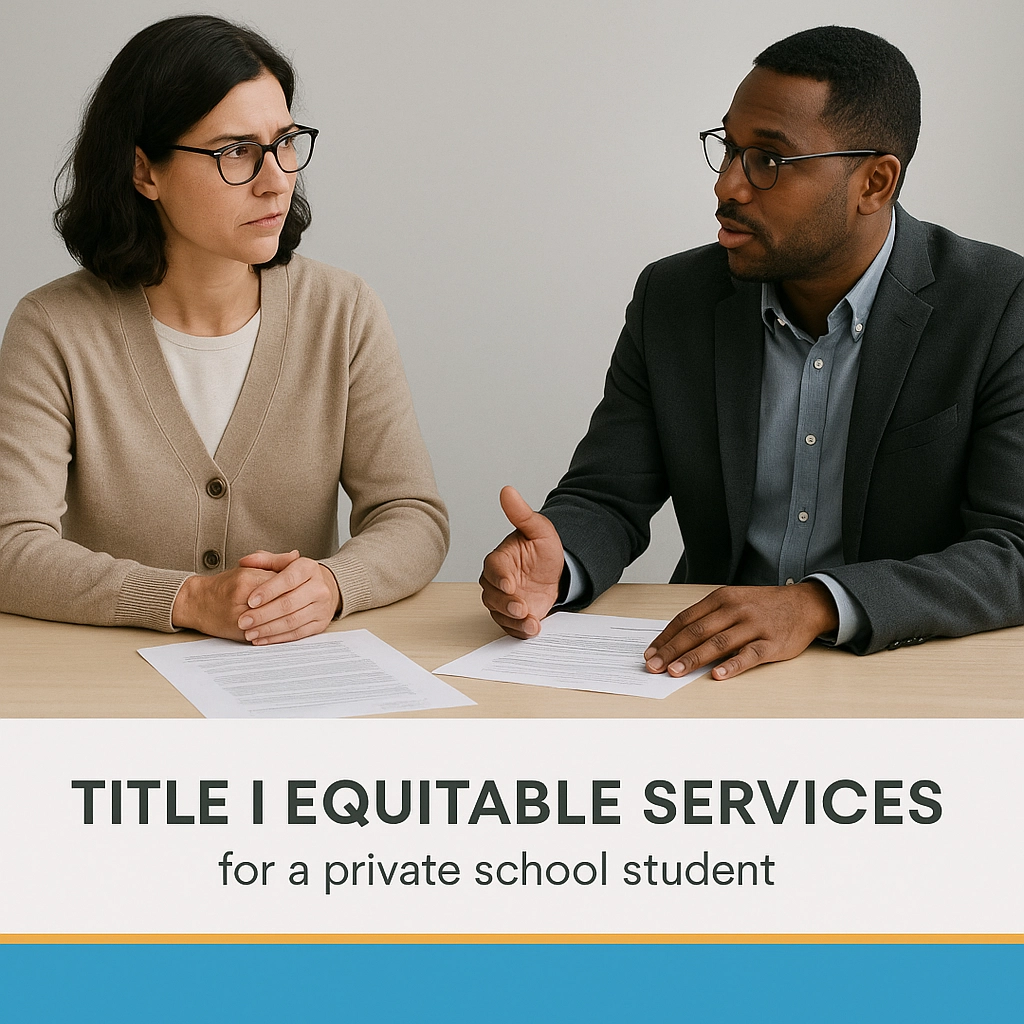Is Your School District Violating Federal Law? 7 Red Flags Every Parent Should Know After the Latest U.S. Department of Education Guidance

As a parent, you have an instinctive sense when something isn't right with your child's education. That nagging feeling when administrators dismiss your concerns, when promised services never materialize, or when your child's needs seem to fall through administrative cracks—trust those instincts. Recent U.S. Department of Education (ED) guidance and resource updates have highlighted persistent compliance gaps across school districts nationwide, and many parents are discovering their districts have been violating federal law for years (ED Guidance).
The good news? Federal education laws exist specifically to protect your child's rights, and recognizing violations is the first step toward ensuring your district fulfills its legal obligations. Key laws include the Individuals with Disabilities Education Act (IDEA), Section 504 of the Rehabilitation Act, Title II of the Americans with Disabilities Act (ADA), Title I of the Elementary and Secondary Education Act (ESEA), and Title VI of the Civil Rights Act (IDEA, Section 504, ADA Title II, ESEA Title I, Title VI). Here are seven critical red flags that signal your school district may be operating outside federal law—and what you can do about it.
Red Flag #1: Denial of Title I Services for Private School Students
If your child attends a private school but lives within a public school district that receives Title I funding, federal law requires that district to provide equitable services to eligible private school students, their families, and educators. ED guidance reinforces this requirement and outlines mandatory consultation with private school officials (ESEA Title I, Part A—Equitable Services; 20 U.S.C. § 6320).
What to watch for: Your district refuses to consult and identify eligible private school students for Title I equitable services, claims they "don't serve private school students," or fails to consult with private school officials when designing programs. The law is clear—districts must provide services that are secular, neutral, and nonideological to improve academic achievement for eligible students within their boundaries, regardless of where they attend school (20 U.S.C. § 6320(a)(1)(A)).
This violation particularly affects families who've made significant financial sacrifices to provide private education while still paying taxes that fund their local public district. You shouldn't have to choose between private school and federal services your child is legally entitled to receive.

Red Flag #2: IEP Team Members Rotating In and Out of Meetings
Your child's Individualized Education Program (IEP) meeting requires specific team members as defined by federal regulations. Schools should not rotate members in and out to avoid these requirements. A required member may be excused only if you and the district agree in writing, and only under IDEA’s excusal rules: if the member’s area is not being discussed (written agreement) or, if it is, only with your written consent after receiving the member’s written input (34 C.F.R. § 300.321(e)).
What to watch for: Administrators frame team member departures as simple requests, putting you in an uncomfortable position where refusing seems unreasonable. They might say, "Ms. Johnson needs to leave for another meeting—you're okay with that, right?" This practice compromises the meeting's integrity and your child's educational planning unless the formal excusal requirements are met in writing.
The pressure tactics are particularly concerning because they exploit most parents' desire to be cooperative and reasonable. Federal law does not allow districts to compromise required team composition simply because it's inconvenient for staff scheduling (34 C.F.R. § 300.321).
Red Flag #3: Inadequate English Learner Services
Districts must provide appropriate language assistance services to English learners under Title VI of the Civil Rights Act and the Equal Educational Opportunities Act (EEOA). They cannot reduce or eliminate services in a way that denies meaningful access to education (2015 Dear Colleague Letter on EL Students; 20 U.S.C. § 1703(f)).
What to watch for: Your district reduces English learner services, eliminates programs that were previously effective, or fails to provide adequate resources despite serving English language learners. With approximately 5 million English learners in U.S. public schools, districts cannot ignore these obligations (NCES: English Learners in Public Schools).
This is particularly troubling for families who've moved to specific districts based on their English learner programs, only to find services disappearing without notice or adequate replacement programs.

Red Flag #4: Literacy Assessment and Retention Violations
Many states have specific requirements for early literacy screening, intervention, and grade retention, and districts must follow their state’s laws while providing appropriate exemptions and retesting opportunities (for example, Alabama Literacy Act and Florida Statutes § 1008.25). Requirements vary by state.
What to watch for: Your district fails to provide required summer retesting opportunities for students who don't pass literacy assessments, improperly denies exemptions for English learners as permitted by state law, or implements retention policies without following required procedures. Some districts rush through assessments or fail to provide adequate remediation before making retention decisions.
Parents often feel helpless when facing retention decisions, but state laws provide specific protections and procedural requirements that districts must follow. Failure to follow these procedures can render retention decisions improper and subject to appeal or review under state processes.
Red Flag #5: School Safety and Discipline Documentation Failures
Under state safe schools statutes and federal law, districts have specific obligations regarding student discipline and safety measures. These include proper documentation and adherence to mandated procedures for disciplinary actions. For students with disabilities, IDEA sets additional protections and procedures (34 C.F.R. §§ 300.530–300.536; OSERS 2022 Discipline Guidance (Q&A)).
What to watch for: Your district fails to maintain proper documentation for disciplinary actions, administrators don't follow required procedures when teachers initiate formal student removals, or disciplinary decisions appear arbitrary or discriminatory. Districts sometimes skip required steps because they're time-consuming, but federal law doesn't allow shortcuts when student rights are at stake.
This is especially critical for students with disabilities, as disciplinary actions can trigger additional federal protections under IDEA that districts sometimes overlook or ignore (IDEA Discipline Overview).

Red Flag #6: School Accountability System Non-Compliance
Under the Every Student Succeeds Act (ESSA), states must implement accountability systems and publish annual report cards with clear, accessible information about school performance. Districts are obligated to provide accurate data and transparency to families (ESSA Overview, State and Local Report Cards).
What to watch for: Your district fails to implement required accountability measures, doesn't provide clear information about school evaluation systems, or appears to manipulate data to avoid accountability requirements. Some districts resist transparency because poor performance might reflect negatively on administration.
Parents deserve accurate, timely information about their schools' performance, and federal law requires states and districts to provide this information in accessible formats (ESSA Report Cards).
Red Flag #7: Pressure to Waive Federal Rights
Perhaps the most concerning violation occurs when districts pressure parents to waive federal rights or accept inadequate services "voluntarily." This often happens during IEP meetings, disciplinary conferences, or when parents raise concerns about services. Parents should know that IDEA provides procedural safeguards and consent protections that cannot be bypassed through informal pressure (34 C.F.R. §§ 300.500–300.517).
What to watch for: Administrators suggest that requesting full federal protections is "adversarial," imply that cooperating means accepting less than what's legally required, or create artificial timelines that pressure quick decisions. Statements like "We can resolve this more easily if you don't involve lawyers" or "This is just how we handle things here" are major red flags. Coercion or retaliation for asserting rights may violate federal civil rights laws (ED OCR: How to File a Discrimination Complaint).
Districts sometimes create artificial urgency or frame legal compliance as optional cooperation, hoping parents won't recognize the difference between voluntary flexibility and required federal protections.
Taking Action: Your Rights and Next Steps
Recognizing these red flags is empowering because it confirms what you already suspected—when something feels wrong with your child's education, there's often a legal basis for your concerns. Federal education laws exist precisely because individual districts cannot be trusted to consistently protect student rights without external accountability.
You don't need to accept vague explanations, delayed services, or pressure to compromise your child's legal protections. Every violation listed above has specific federal remedies, and districts know this—which is why they often hope parents won't recognize violations or won't pursue their rights.
If you've identified one or more of these red flags in your district's practices, consider documenting incidents with dates, names, and specific statements. Federal law provides multiple avenues for addressing violations, from informal advocacy to formal complaints and legal action—for example, IDEA dispute resolution options (mediation, state complaint, due process) and civil rights complaints with ED’s Office for Civil Rights (IDEA Dispute Resolution; OCR Complaint Process).
Remember that your instincts as a parent are valuable data points. When combined with knowledge of federal requirements, those instincts become powerful tools for ensuring your child receives the education they legally deserve.
The most important thing to understand is that you're not alone in this process. Education law exists specifically to level the playing field between individual families and large institutional systems. When districts violate federal law, it's not a reflection of your child's worth or your advocacy skills—it's a compliance failure that can be addressed through appropriate legal channels.
Whether you're dealing with current violations or want to prepare for potential future issues, understanding your federal rights is the foundation of effective advocacy for your child's education.
